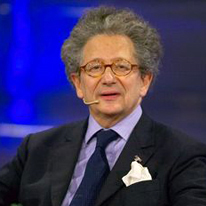Azerbaijan, Baku, April 22/ Trend corr. E.Ostapenko/
The decision of the President of France Nicolas Sarkozy to visit Libya to meet rebels is the logical continuation of him-chosen plan of actions on Libya, Dominique Moisi, famous French analyst, believes.
"The meeting with rebels is an information signal, using which the rebels acquire greater legitimacy in the deadlock situation, in which the country now is", Moisi, the founder of France-based research center IFRI, and currently an observer of Project Syndicate, told Trend.
Having received the head of Libyan rebels in Elysium Palace on Wednesday, Sarkozy agreed to visit the town of Benghazi, the key stronghold of opponents of the Muammar Qaddafi regime, Mustafa Abdel Jalil, Head of the transitional National Council established by the Libyan rebels, reported on Thursday evening. He said preparations for the visit are currently underway.
Moisi believes that Sarkozy's agreement to visit personally rebel-held Libyan region is a logical step. "Recognizing the Libyan rebels, I meet them," Moisi explained the actions of the French leader. "The international community wants Qaddafi to leave, and I'm going a bit further - I'm meeting the rebels. By doing so, I support the choice I made earlier," Moisi said.
Sarkozy promised to help the rebellious National Council of Libya, which asked France to strengthen air strikes on the positions of Qaddafi and provide humanitarian assistance to the population of Misratah - 200 kilometers east of the capital Tripoli - under fierce fighting at the moment.
The French Government earlier reported its decision to send several military specialists to Benghazi to help rebels "defend Libyan civilians".
The National Council was established in the Libyan eastern town of Benghazi that fell under the rebels' control soon after the unrest began. The Council declared itself the only legal body of power in the country. Italy, France and some other countries recognized the legitimacy of the transitional council.
The country's west continues to remain under control of Colonel Qaddafi who has been ruling the country for more than 40 years.
France has been very active in its Libya-related initiatives since the military confrontation began in February. In addition, France was against the transition of the military operation to the NATO as it tried to limit the NATO role in air campaign coordination and allow coalition member states keeping the political control of Libya.
Moisi, the author of book "The Geopolitics of Emotion", underlines three key factors of France's active involvement in the settlement of the situation in Libya. These factors are "Sarkozy", "Qaddafi", and "The situation when the Arab revolution may spread wider".
"The Sarkozy factor is fundamental. The French president loves crises, with their concomitant surge of adrenaline. For him, this is what power is about: taking hard decisions under unfavorable circumstances," Moisi writes in his article "Sarkozy Goes to War" published by Project Syndicate.
Moisi says France's involvement in the Libyan issue may also rehabilitate Sarkozy in the eyes of French citizens whose votes he will need at the next year presidential election. According to assessments, the President's rating falls from day to day due to the unpopular socioeconomic reforms of the government, including budgetary cuts and unfavorable situation at the labor market.
At the same time, Moisi considers it naive to expect that the peacekeeping activities of President Sarkozy in Libya will be a powerful argument in favor of Sarkozy in the next elections. "Of course, success in Libya and fall of Gaddafi may be perceived positively, but that does not encourage French people to vote for him," Moisi told Trend.
"The second factor is that Qaddafi is the ideal villain. A caricature of a despot, he personifies the type of odious adversary whom all democrats want to see defeated," Moisi said in article for Project Syndicate.
"The terrorist attacks on Western targets that he ordered include not only the Pan Am tragedy in Lockerbie, Scotland, but also a French UTA plane blown up over Africa," he writes.
France has a common history and geography with the countries on the southern Mediterranean shore. The duty to intervene - and the cost of indifference - is probably higher for France than for any other Western country, Moisi said.
Indeed, France has a very large immigrant population that originated in the Maghreb, and for which the "Arab spring" is vitally important and a source of fascination and pride. And today, with France taking the lead in an international effort to protect the Libyan people from their leader, they can feel simultaneously proud of being French and of their Arab roots. These positive identities constitute the best protection against the sirens of fundamentalist Islam, said Moisi.
"France, together with Great Britain, and with the more distant support of the US, is undeniably risking much, for it is easier to start a war than it is to end one. But it is a worthwhile risk, Moisi said in his article. The cost of non-intervention, of allowing Qaddafi to crush his own people, and of thus signaling to the world's despots that a campaign of domestic terror is acceptable, is far more menacing."






